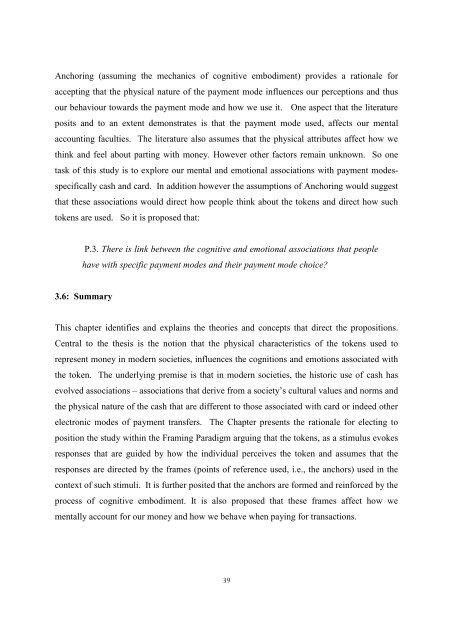Cash or Card: Consumer Perceptions of Payment Modes - Scholarly ...
Cash or Card: Consumer Perceptions of Payment Modes - Scholarly ...
Cash or Card: Consumer Perceptions of Payment Modes - Scholarly ...
You also want an ePaper? Increase the reach of your titles
YUMPU automatically turns print PDFs into web optimized ePapers that Google loves.
Anch<strong>or</strong>ing (assuming the mechanics <strong>of</strong> cognitive embodiment) provides a rationale f<strong>or</strong><br />
accepting that the physical nature <strong>of</strong> the payment mode influences our perceptions and thus<br />
our behaviour towards the payment mode and how we use it. One aspect that the literature<br />
posits and to an extent demonstrates is that the payment mode used, affects our mental<br />
accounting faculties. The literature also assumes that the physical attributes affect how we<br />
think and feel about parting with money. However other fact<strong>or</strong>s remain unknown. So one<br />
task <strong>of</strong> this study is to expl<strong>or</strong>e our mental and emotional associations with payment modes-<br />
specifically cash and card. In addition however the assumptions <strong>of</strong> Anch<strong>or</strong>ing would suggest<br />
that these associations would direct how people think about the tokens and direct how such<br />
tokens are used. So it is proposed that:<br />
P.3. There is link between the cognitive and emotional associations that people<br />
have with specific payment modes and their payment mode choice?<br />
3.6: Summary<br />
This chapter identifies and explains the the<strong>or</strong>ies and concepts that direct the propositions.<br />
Central to the thesis is the notion that the physical characteristics <strong>of</strong> the tokens used to<br />
represent money in modern societies, influences the cognitions and emotions associated with<br />
the token. The underlying premise is that in modern societies, the hist<strong>or</strong>ic use <strong>of</strong> cash has<br />
evolved associations – associations that derive from a society’s cultural values and n<strong>or</strong>ms and<br />
the physical nature <strong>of</strong> the cash that are different to those associated with card <strong>or</strong> indeed other<br />
electronic modes <strong>of</strong> payment transfers. The Chapter presents the rationale f<strong>or</strong> electing to<br />
position the study within the Framing Paradigm arguing that the tokens, as a stimulus evokes<br />
responses that are guided by how the individual perceives the token and assumes that the<br />
responses are directed by the frames (points <strong>of</strong> reference used, i.e., the anch<strong>or</strong>s) used in the<br />
context <strong>of</strong> such stimuli. It is further posited that the anch<strong>or</strong>s are f<strong>or</strong>med and reinf<strong>or</strong>ced by the<br />
process <strong>of</strong> cognitive embodiment. It is also proposed that these frames affect how we<br />
mentally account f<strong>or</strong> our money and how we behave when paying f<strong>or</strong> transactions.<br />
39

















